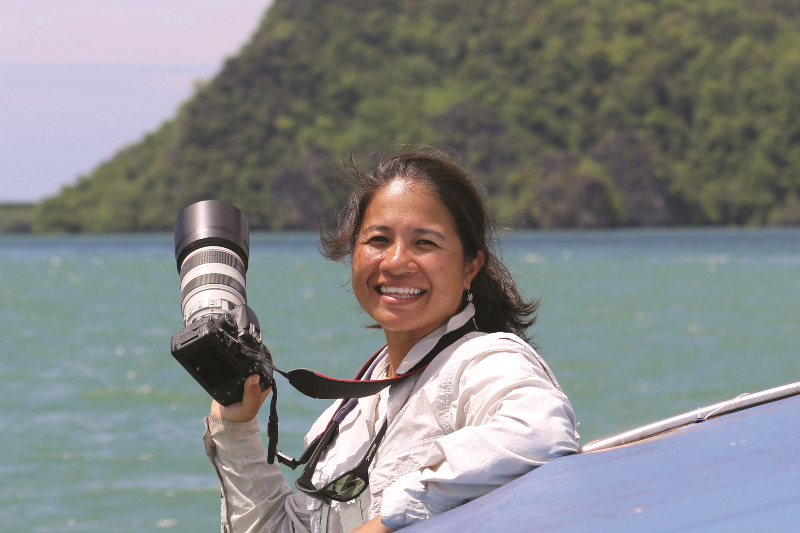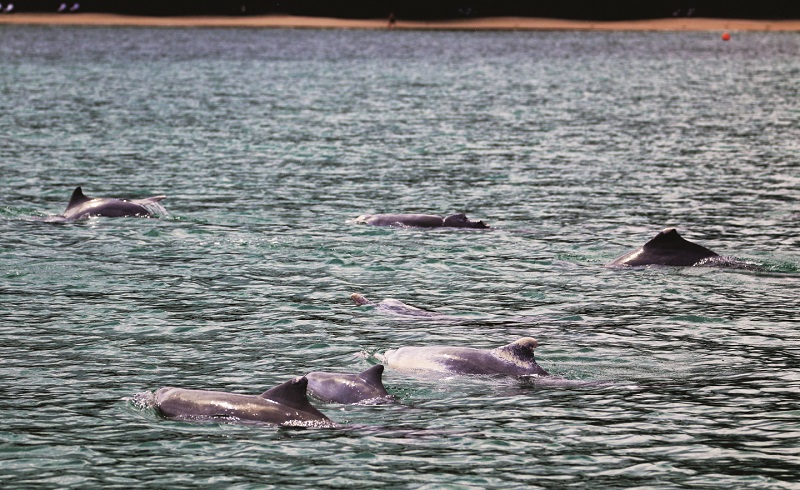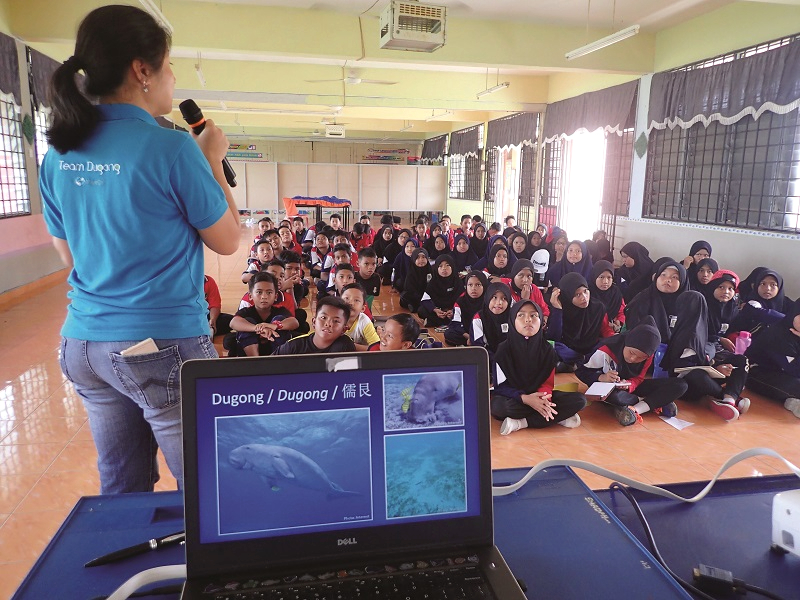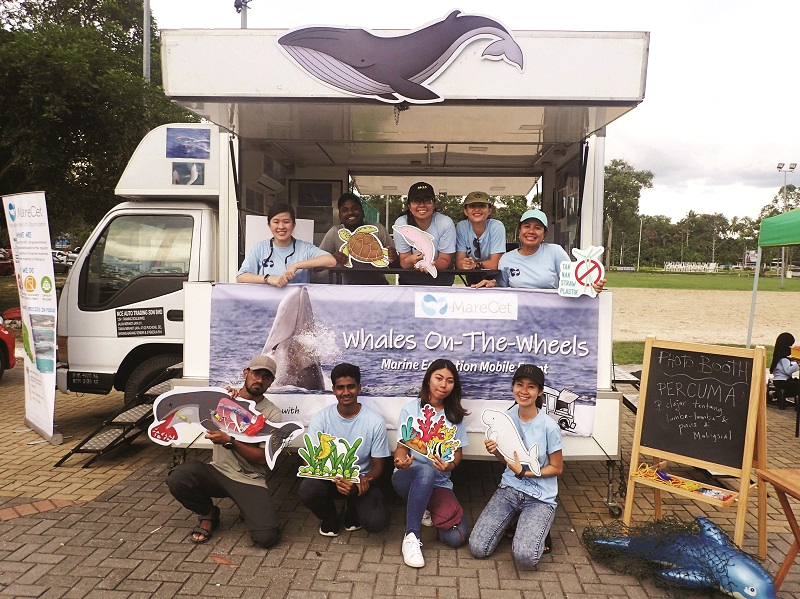
Ponnampalam is MareCet's chairperson, co-founder and executive director (All photos: The MareCet Research Organization)
MareCet — a portmanteau of “mare”, which is ocean in Latin, and “cetacean”, the scientific grouping of whales, dolphins and porpoises — was established in 2012 with the main purpose of undertaking research and conservation of marine mammals in Malaysia. Started by Dr Louisa Ponnampalam and Fairul Izmal Jamal Hisne, it is the first non-profit non-governmental organisation (NGO) to do so, and is currently one of the key contact points in the country for all matters related to marine mammals.
“It was always a plan of mine, even as a teenager, to go abroad, study and then come home and set up my own sort of research institution,” Ponnampalam tells Options. “Now, MareCet isn’t a research institution per se. I think it has gone beyond that. As an NGO, we get to do research, conservation outreach, participate in policy work with the government and give young Malaysians a platform … I want to give the young me in the present day the opportunity to learn more about marine mammals while growing up.”
No one can doubt Ponnampalam’s passion for marine mammals. At a young age, she became obsessed with dolphins, earning the nickname “dolphin girl” in school, and set out to become a marine biologist at a time when no one really knew what that meant. She completed her degree in marine science at the University of Hawai‘i at Hilo. Securing a Commonwealth Scholarship for her postgraduate position at the University Marine Biological Station in Millport, Scotland, she went on to study the ecology of small cetaceans, particularly spinner dolphins, in the Sultanate of Oman. After completing her PhD in 2008, she came home.
sc_grp_lgkw_1.jpg

So little was known in Malaysia about creatures like dolphins and whales at the time. Even today, many people are surprised that we have any. Although Ponnampalam was enthusiastic to get to work, many doors were shut in her face. And at the meetings she managed to get into, she was met with resistance, especially because of her gender. Still she persevered, carrying out her work with the help of research grants and ignoring naysayers every step of the way.
Today, the majority of MareCet’s core team are women and Ponnampalam continues to inspire them. “I am really proud of the team that we have built, and MareCet would not be where it is today if not for such a dedicated team. I’ve always instilled in my team of young women that nothing comes easy, but here we have a chance to carve out something new and good, so believe in yourself, believe in your capabilities. No other person should ever tell you that you can’t do it just because you’re a girl. Conservation needs everyone.”
The team behind MareCet, some of whom are volunteers, have achieved incredible things. These impressive feats include establishing the National Marine Mammal Stranding Response Network, being pivotal in the revision of Malaysia’s National Policy on Biological Diversity (2015-2025), and planning the establishment of the Johor Dugong Sanctuary.
p4241280_1.jpg

“[MareCet] was born out of passion but also frustration. It was a bit frustrating to not be able to do the work that I wanted to do in the way that I wanted to do it. So, I thought why not establish something where we can make our own rules?” says Ponnampalam. It has come a long way from its early days as a virtually unknown NGO. Its popularity began to grow when its founder was awarded the prestigious 2014 Pew Fellowship in Marine Conservation.
To date, MareCet has successfully had three field sites — the Satun-Langkawi archipelago, the Matang mangroves and coastal waters, and the Mersing archipelago — recognised by the International Union for the Conservation of Nature (IUCN) as Important Marine Mammal Areas. “There are no legal definitions of an IMMA, but it is an international recognition, that these three areas are important for marine mammals. At MareCet, this is something that we can use to lobby the government to push it to really think about getting on-the-ground protection,” says Ponnampalam.
One of the most common misconceptions MareCet faces is the work that it does. At the beginning, it was all about research. “There was so much of a gap in the knowledge base of what we knew about marine mammals in this region, that a lot of it really started with just the basics: we just had binoculars, a GPS, data sheet and camera. That is a good starting point to collect a lot of information because once we get that information, we can scale it many ways,” says Ponnampalam.
This part of the research helps establish patterns; for example, it gives an idea of where and how the dolphin population is distributed, where they breed, where they feed and so on. Photos allow researchers to keep track of the mammals in the area, instead of using invasive and expensive methods such as tagging.
pb090155_edited_1.jpg

However, research and science are just the tip of the iceberg. “Conservation is so much more than just being in the field. There’s translating your data into digestible material for the public, preparing reports, fundraising ... the whole works,” she says. “As an organisation, we need to look at financial sustainability and operations. A lot of it is communication, understanding what makes a person tick, understanding what it takes for a person to want to change. Looking at behaviour that is negatively impacting the environment, finding ways to work together with stakeholders, impacting behavioural change. So, conservation is complex; it is not a straight ‘I want to save the dolphins’ road, not in any way.”
While love and understanding for marine mammals is common in the Western world, it is less so in Asia. Ponnampalam explains that there are three main causes that people would rather support: Human causes, which range from cancer to diabetes; terrestrial conservation, which protects iconic species that Malaysia is known for such as the orangutan and tigers; and other marine species like coral reefs and sea turtles, which people prefer as there is an interactive element and we tend to know more about them. Although these are all worthy causes, marine mammals end up being forgotten.
“Conservation is never going to be easy, but I think it is extra challenging working in a place like Malaysia because of the lack of awareness of the importance of the work we do. We are essential workers, but people don’t see it that way. They say, ‘Aiya, you’re just dolphin watching.’”
These are the same causes that MareCet must compete with for funding and grants to continue its good work. To be sustainable, the organisation has developed other income streams such as marine excursions, charity bazaars and school programmes. However, the pandemic has reduced cash flow to a mere trickle.
MareCet has migrated the dolphin tour online, taken school programmes online with pre-recorded lessons or Zoom calls and begun a lecture series called “Marine Mammals Around the World From Home”. MareCet is on the lookout for funding to keep afloat and is open to volunteers helping with a range of tasks, from illustrations and graphic design to fundraising and content creation.
Although the future seems bleak, Ponnampalam is hopeful that her team will be able to go to the field to collect data by September and restart excursions. She hopes people will understand that MareCet’s work is, in fact, an essential service. “Marine conservation is essential. We have to remember that on our blue planet, the ocean and sea support life. We don’t give the beautiful sea enough credit. We don’t keep her in the corner of our minds as much as we should. And as a result, we forget to do what is right to protect it. Everyone can be an everyday ocean hero.”
Donate to MareCet here.
This article first appeared on July 26, 2021 in The Edge Malaysia.


